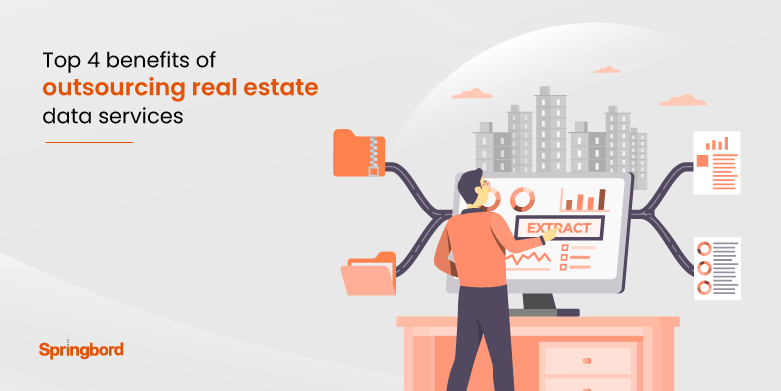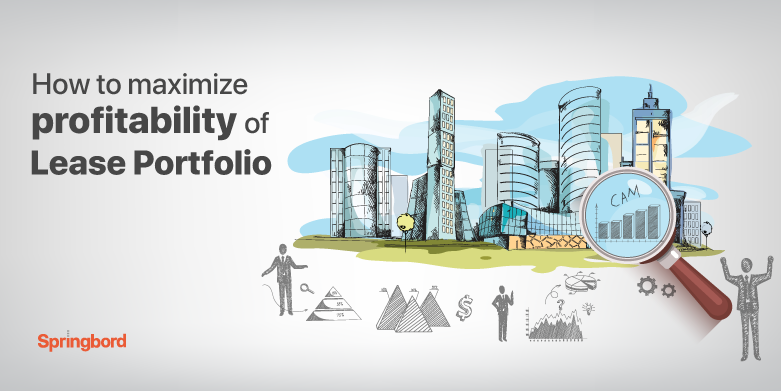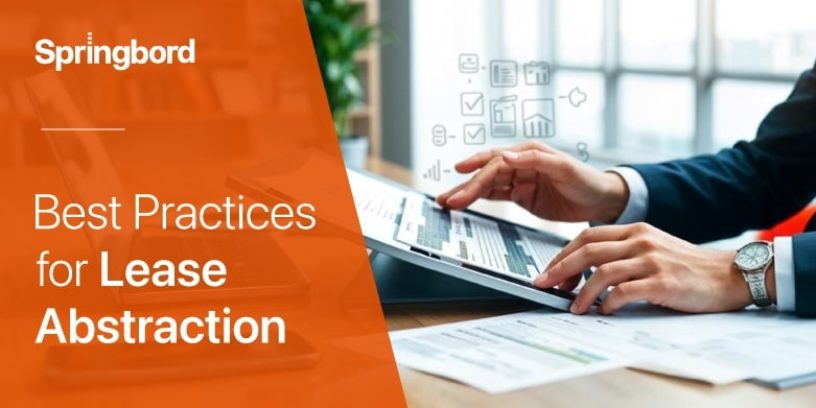 Read time 6 min
Read time 6 minEffective lease management is essential for keeping a competitive edge in the complex world of commercial real estate. An important part of this process is lease abstraction, which is the process of reducing complicated lease agreements to key takeaways.
By adopting best practices in lease abstraction, business owners can ensure they have a clear understanding of their obligations and opportunities, enabling them to make informed decisions, mitigate risks, and optimize their portfolios.
This blog delves into the best practices that can help you master lease abstraction, ensuring your real estate operations are both efficient and strategically sound.
Purpose of Lease Abstraction
Fundamentally, lease abstraction is a useful instrument that converts complex legalese into clear, pertinent information that is essential for both strategic planning and daily operations. Commercial leases are often complex, containing numerous clauses, terms, and conditions that vary significantly across different properties. These documents can be challenging to access, especially when managing a large portfolio of properties.
Lease abstraction simplifies this complexity by highlighting key elements such as rent obligations, renewal options, termination rights, and compliance requirements, making them easily accessible and understandable.
In an environment where missing a critical lease date or overlooking a particular clause can result in significant financial losses or legal disputes, the strategic importance of lease abstraction cannot be overstated. It enables business owners to maintain a clear and organized view of their lease obligations and opportunities, ensuring that they can act swiftly and effectively when needed.
Key Benefits of Lease Abstraction
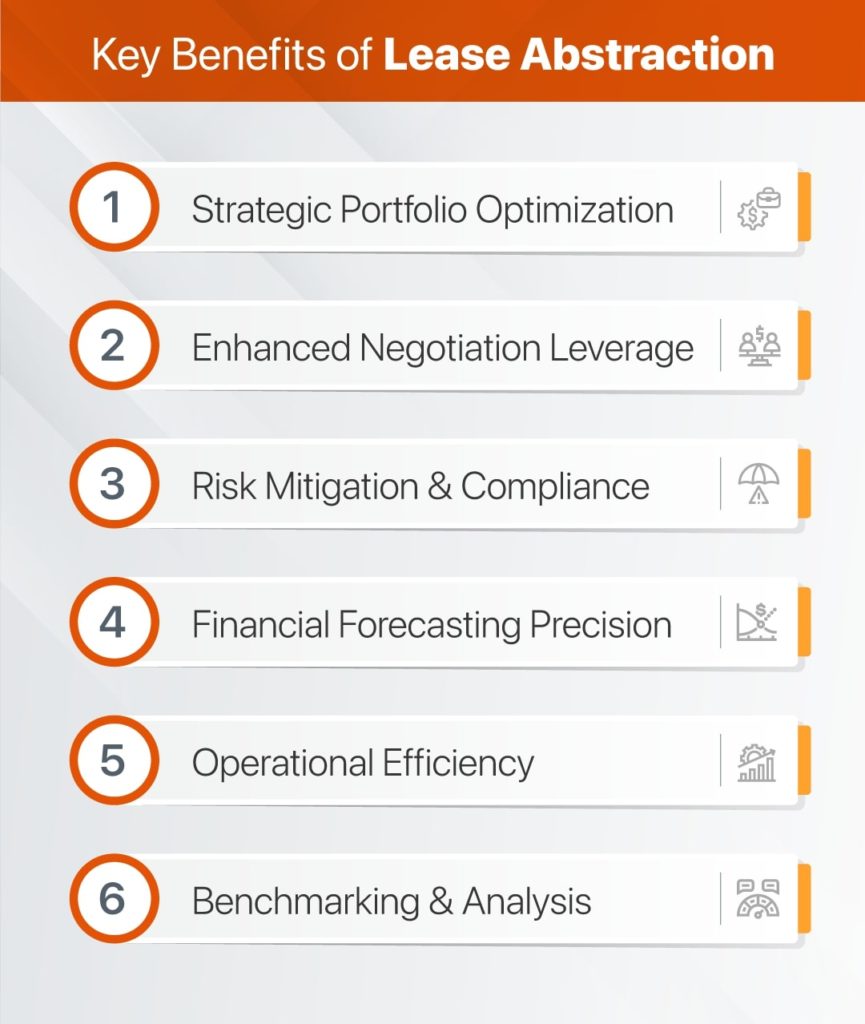
- Strategic Portfolio Optimization: Lease abstraction enables business owners to aggregate and analyze important data across their entire property portfolio. Owners can decide whether to expand, consolidate, or divest properties to better align with overall business objectives by having a thorough understanding of occupancy levels, rental rate variations, and lease expiration patterns.
- Enhanced Negotiation Leverage: With detailed lease abstracts, business owners are equipped with a clear understanding of all lease terms and clauses, which is crucial during negotiations.
- Risk Mitigation and Compliance: By systematically tracking and abstracting lease details, business owners can proactively identify potential risks, such as missed critical dates or non-compliance with lease obligations. This ensures that all legal and regulatory requirements are met, reducing the risk of costly disputes or penalties and protecting the company’s interests.
- Financial Forecasting Precision: Lease abstraction provides a clear view of all financial commitments associated with each lease, including rent, maintenance fees, and other obligations. This level of detail enhances the accuracy of financial forecasting, allowing for better cash flow management, budget planning, and overall financial oversight.
- Operational Efficiency: Abstracting leases streamlines property management by making essential lease details readily accessible. This reduces the time spent on administrative tasks, such as searching through lease documents for specific information, and enables faster, more informed decision-making.
- Benchmarking and Analysis: Lease abstraction allows for the comparison of lease terms across different properties, providing valuable insights for benchmarking against market standards. This analysis helps business owners identify areas where their leases may be less favourable compared to market conditions and take corrective action to improve their competitive positioning.
By outsourcing lease abstraction services, businesses gain access to these key benefits without the need to dedicate internal resources. With experts managing and organizing lease data, companies can focus on strategic growth while ensuring their real estate portfolios are optimized, compliant, and financially sound.
These benefits equip business owners with the tools and insights needed to manage complex lease portfolios more effectively, leading to strategic, operational, and financial advantages.
Best Practices in Lease Abstraction
Managing multiple leases efficiently requires a systematic approach to lease abstraction. As business owners and property managers deal with complex and varied lease agreements, adopting best practices in lease abstraction ensures that they can extract the most critical information quickly and accurately.
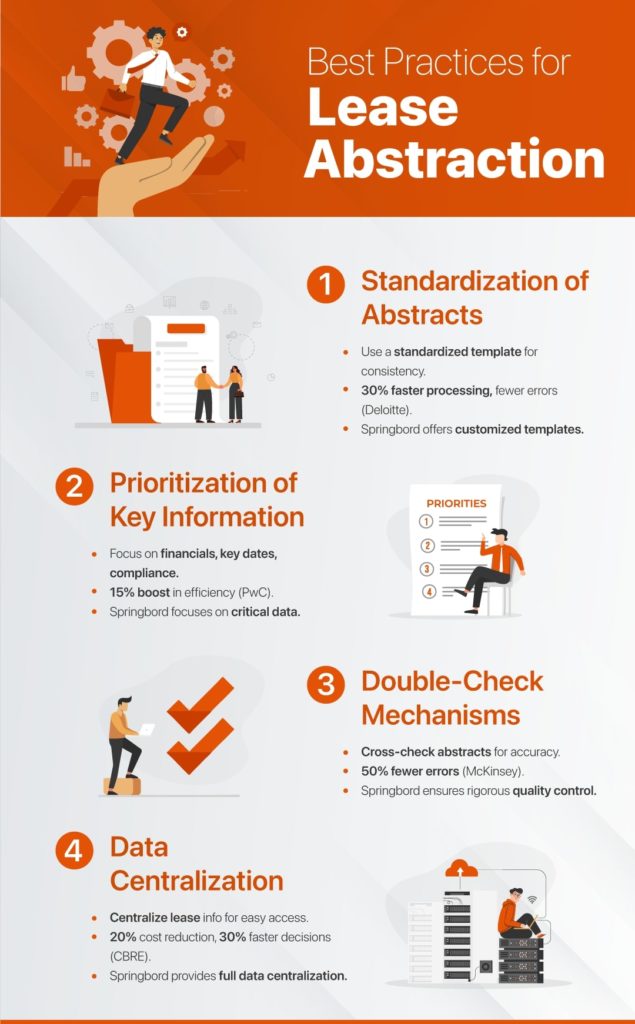
This not only enhances operational efficiency but also supports better decision-making and risk management. Below are some of the best practices that should be at the core of any lease abstraction process.
Standardization of Abstracts
Creating a standardized abstraction template is essential for ensuring consistency across multiple leases. When dealing with a large portfolio, variations in how lease details are captured can lead to confusion, errors, and inefficiencies. A standardized template ensures that all key data points, such as rent escalation clauses, renewal options, and termination rights, are consistently recorded in the same format, making it easier to compare and analyze leases across different properties.
According to a Deloitte study, standardizing lease abstracts can reduce processing time by up to 30% and significantly decrease the likelihood of errors. By maintaining a consistent format, business owners can streamline lease management processes and ensure that critical information is readily accessible and comparable.
Springbord specializes in creating customized lease abstraction templates that cater to the specific needs of your portfolio, ensuring that consistency and clarity are maintained across all documents.
Prioritization of Key Information
In complex lease agreements, not all information is of equal importance. Effective lease abstraction involves identifying and prioritizing the most critical data points that directly impact the business. This includes financial obligations, key dates, and compliance requirements. By focusing on these essential elements, business owners can ensure that they are always aware of their most important lease obligations and opportunities.
According to PwC’s Real Estate 2020 report, prioritizing key information in lease management can lead to a 15% increase in overall portfolio efficiency. By honing in on the most relevant data, businesses can better manage their real estate assets and avoid costly oversights.
Springbord’s lease abstraction services are designed to focus on the most critical data points, ensuring that clients have the information they need to make informed, timely decisions.
Double-Check Mechanisms
Implementing quality control processes is important to maintaining accuracy in lease abstraction. One of the most effective methods is to have abstracts cross-checked by different team members. This double-check mechanism helps to catch errors or omissions that may have been overlooked initially. Given the high stakes involved in lease management, even minor mistakes can lead to significant financial consequences.
A study by McKinsey found that incorporating double-check mechanisms in document processing can reduce error rates by up to 50%. By ensuring that each lease abstract is meticulously reviewed, businesses can safeguard against costly mistakes.
Springbord employs rigorous quality control processes, including multiple layers of review, to ensure that our clients receive accurate and reliable lease abstracts.
Data Centralization
Centralizing lease data into a single, accessible database is essential for effective portfolio management. With lease information stored in various formats and locations, retrieving and analyzing data can be time-consuming and prone to errors. A centralized database allows for quick access to all lease information, enabling efficient portfolio analysis and decision-making.
According to CBRE’s Global Real Estate Market Outlook, companies that centralize their lease data see an average 20% reduction in administrative costs and a 30% improvement in decision-making speed. Centralization also facilitates better compliance tracking and financial planning.
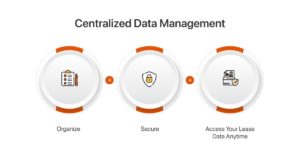
Springbord offers complete data centralization services, ensuring that all your lease information is organized, secure, and readily accessible for analysis and decision-making.
Conclusion
Managing commercial real estate portfolios requires effective lease abstraction because it gives company owners the clarity and insights they need to reduce risks, make strategic decisions, and maximize operations. By carrying out best practices, companies can significantly enhance their lease management processes.
These practices not only improve efficiency but also empower businesses to stay ahead in the competitive real estate landscape.
Ready to streamline your lease management process? Springbord’s expertise in lease abstraction and data solutions can help you optimize your portfolio, reduce costs, and drive growth. Contact us today to learn how our tailored services can support your strategic real estate objectives.
Frequently Asked Questions (FAQ)
1. What is lease abstraction, and why is it important for commercial real estate?
Lease abstraction simplifies complex lease terms, helping businesses make informed decisions and manage risks effectively.
2. How does this blog help businesses manage their lease portfolios effectively?
The blog provides best practices for lease abstraction to improve efficiency, decision-making, and risk management.
3. Can outsourcing lease abstraction services improve decision-making in commercial real estate?
Yes, outsourcing ensures fast access to accurate lease data, enabling quicker and more informed decisions.
4. How can Springbord help my business with lease abstraction and portfolio management?
Springbord offers customized lease abstraction services to streamline operations and improve portfolio management.
5. Why should I standardize lease abstracts across my property portfolio?
Standardizing abstracts ensures consistency, reduces errors, and improves efficiency in lease comparisons and analysis.
6. What are the potential risks of not outsourcing lease abstraction services?
Without outsourcing, businesses may face missed deadlines, overlooked clauses, and inefficiencies in lease management.
7. How does lease abstraction contribute to risk mitigation in real estate management?
It helps track key lease dates and obligations, reducing the risk of missed deadlines and costly legal issues.






